How to Study
It's the chapter you've all been waiting for.
Sadly, there isn't some master way to study so that you'll get full marks with everything you do. If that was the case, I would be at MIT right now - if I remembered to fill out the application (sorry again mom). Different people have different methods to best help them. I'll share with you a couple of resources I know and explain how I would study for a specific subject that goes down to humanities and STEM (science, technology, engineering, and math).
Before we get started, I want to explain another thing about myself I forgot to mention in the "About Me" which will be quite important in this chapter. I have ADHD inattentive present. That means that I'm not hyperactive and bouncing off the walls given I'm pretty calm and introverted. Instead, I have a really bad attention span. I don't mean drifting off in lectures, I mean you can have a conversation with me with our eyes locked, and I would drift off and not be able to hear everything. It was both embarrassing and frustrating.
Before I was diagnosed, I didn't think much of ADHD. Rick Riordan's Percy Jackson series had characters with ADHD and my childhood favorite Youtuber Ryan Higa/Nigahiga had ADHD too. Everyone always had the "ADHD" moment when they forget something or didn't pay attention. But that's the problem with ADHD, people can sometimes experience it which downplays the actual severity of the disorder when people always experience it.
I was diagnosed in my sophomore year in college when the results came out a day before my birthday - quite the gift for myself. High school was a breeze, but entering college, a school such as UC Berkeley, I believed that I would have a tough time anyway. However, it wasn't until I began studying with my friends did I realize the differences in productivity when we were learning the same things at the same time. However, I just believed I was lazy and unmotivated as a student and I just needed to try harder. It wasn't until I had my first summer internship did I realize how much this can really affect me when my supervisor had to give me the same instructions multiple times, how I had to keep asking follow-up questions because I didn't remember the instructions, or how I couldn't follow along in a meeting no matter how hard I kept reminding myself I needed to but still drifted.
From my diagnosis, the high school work was easy enough for me to breeze through without studying. However, since I didn't develop good study habits when I actually needed to study with these difficult courses in college, I suddenly struggled. After my diagnosis, my friend timed me when I studied without my knowledge, and I had an attention span of an average of 12 minutes before I was on my phone or something with the breaks being much longer than the 12 minutes. Now you'll probably want to comment things like: "omg same", "why is this me?", "I totally relate". And that's my point, anyone can experience it, but you shouldn't downplay or belittle this disorder just because of that. People with ADHD face discrimination because of it. People can have hidden disabilities and you should never discriminate against them regardless if you can see or not see that disability.
From this, I want to then introduce you to a resource your school or college should have. My school has the Disabled Students' Program (DSP) where they give students resources, services, and tools they need to help them in school and life. There's a process to be properly assessed for you to be in the program to make sure you're not abusing it. Once you have entered it, you get accommodations such as participating in workshops, getting recording devices, or getting extra time in your exams or homework. Both students and professors have belittled the program. A student grader confessed how a professor told them to grade DSP students harder because they didn't believe in the program. It isn't about equality but equity. Yes, there may be some students who abuse the program, but for every one student who does, there are a hundred if not a thousand who need it. I entered the program right before the pandemic so I haven't been able to utilize the program well with the transition to online classes. With this, I want to explain to you that there are resources out there that can help you and this is one of them.
In the program, I attended a one-on-one session with a specialist who introduced me to several ways you can study. As I said before, different people need different methods depending on what best suits them. The resource is from "learningscientists.org" and I'll attach the posters right here for you to go over yourself.
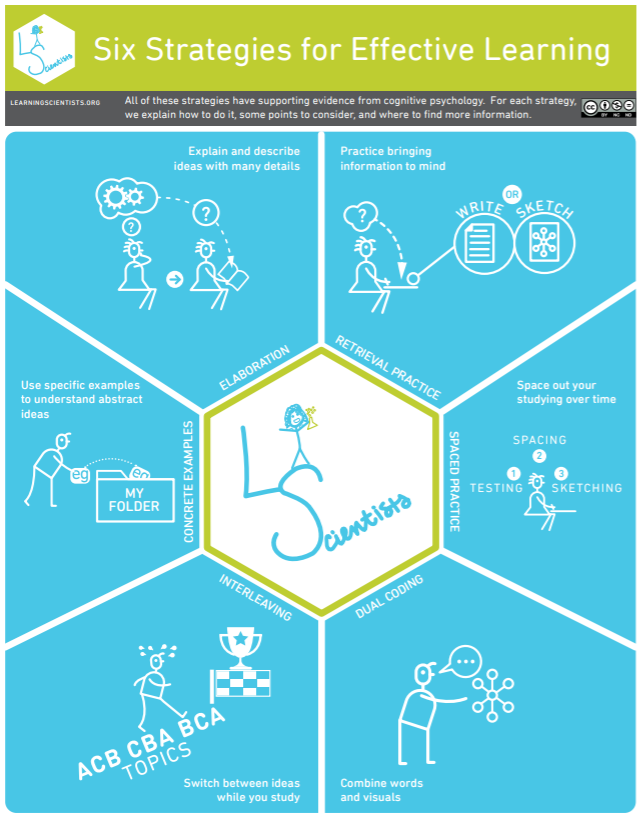
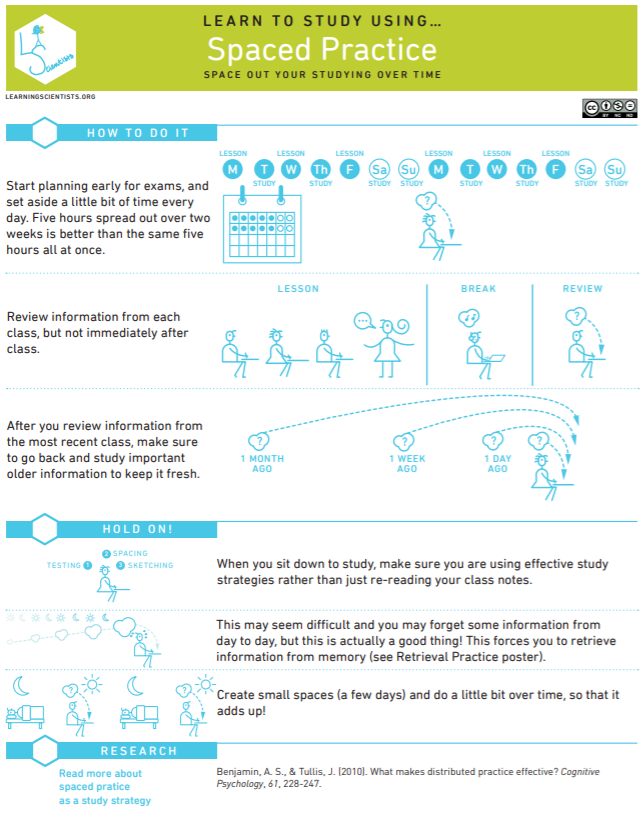
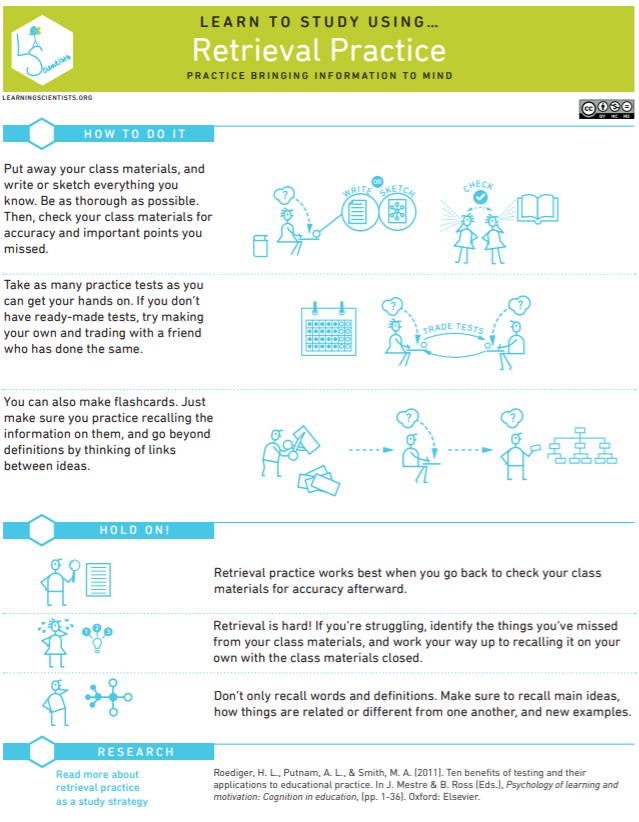

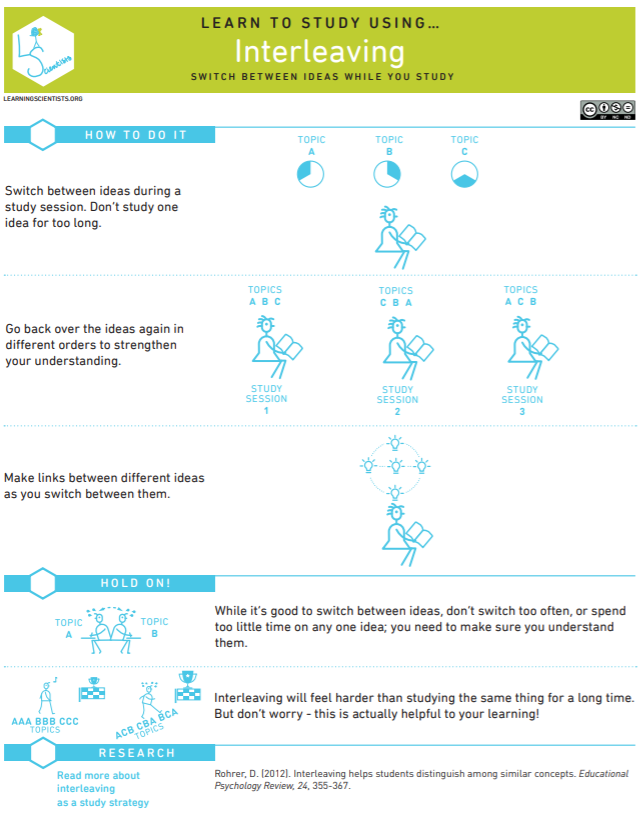
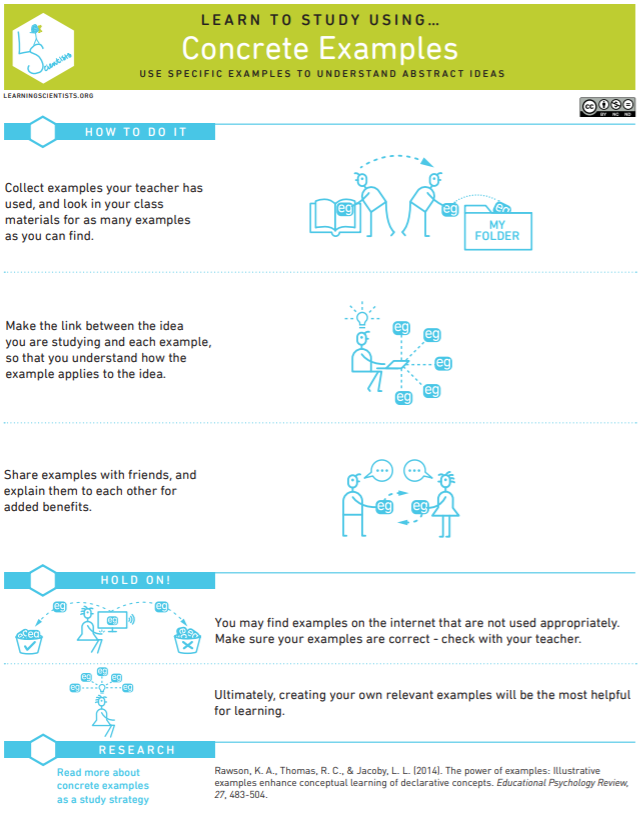

There is also the Pomodoro technique. It's a time management method where you use a timer to give a set amount of time when you work and another amount of time when taking a break. An example is that you have one session with four sets. In each set, you study for 15 minutes and then take a break for 5 minutes. At the end of one session, you take a break for 10 minutes before beginning another session. I knew about it before being diagnosed, but never believed in it and I would cut corners with it like I study for 30 minutes and take a break for 5 but sometimes push it to 10 because I deserve it. You shouldn't do that because you'll revert back to procrastinating and being unproductive. You need to follow the technique strictly for it to be effective.

One great resource is Khan Academy. It's a non-profit educational organization that has a free website that provides instructional videos, practice exercises, and personalized learning courses for students. It has subjects of all grade levels such as math, science, arts and humanities, English language arts (ELA), economics/finance, and test prep. I used Khan Academy heavily to study for my SAT as well as my STEM classes both in high school and college. Sometimes you can use KA in replacement of your teacher as I have done so before, but you shouldn't always do it or heavily depend on it because your teacher is what grades your work in the end.
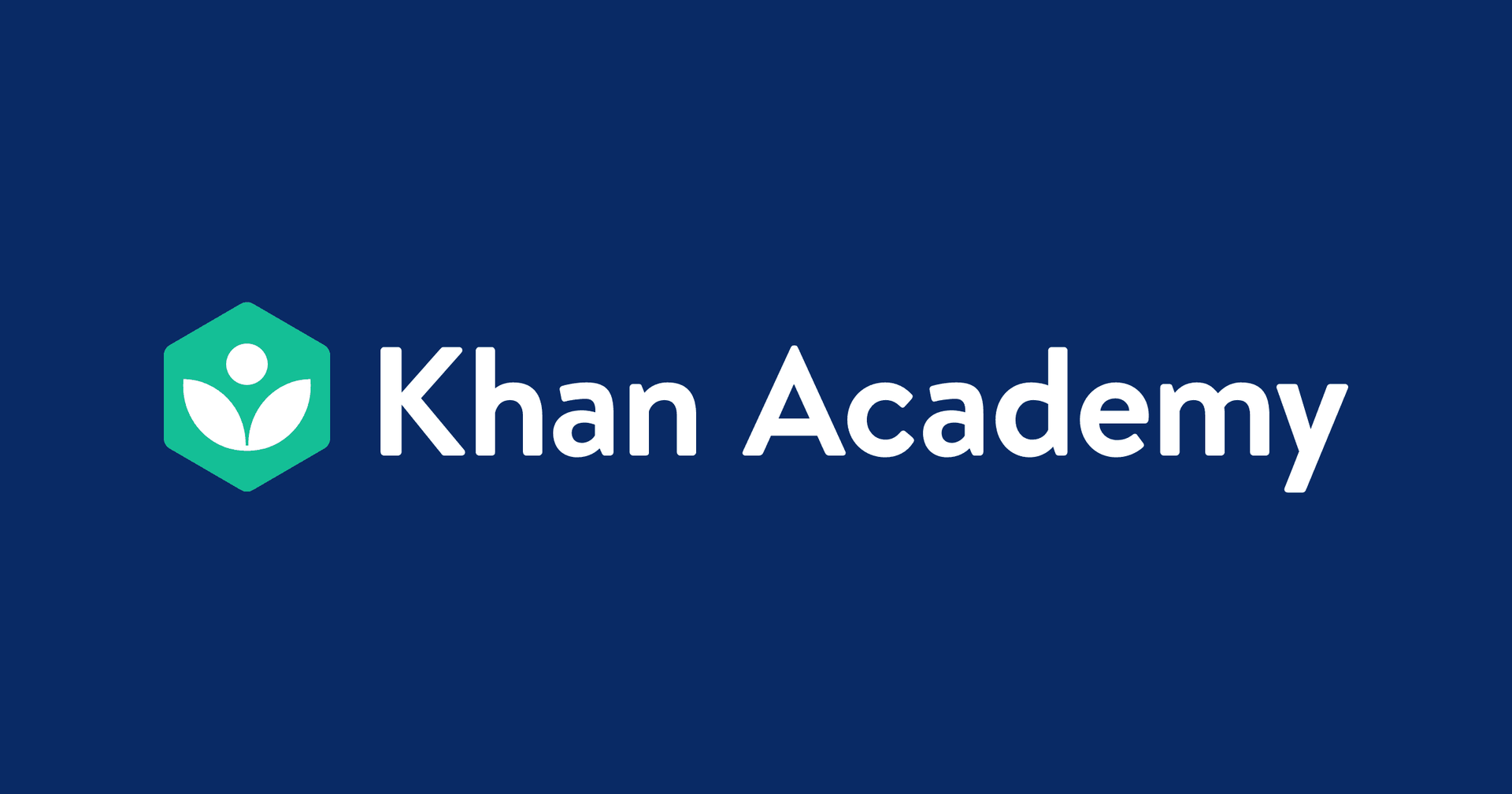
I have two math Youtubers I recommend: patrickJMT and Dr Peyam (he guest-lectured in my Multivariable Calculus class and he was so amazing everyone laughed and applauded every few minutes. He would introduce a topic and would say something like "how I would solve this problem is through the 'just do it method' where you just do it"). If you're going to go into engineering and need to take a Solid Mechanics course (it's like Physics on steroids because you apply the stress on beams and columns), I heavily depended on the Youtuber Jeff Hanson - he's a hilarious sweetheart of a guy because my professor's teaching style didn't work for me.
Another great resource is Quizlet which is a website where you can make flashcards and test yourself. You can create multiple-choice or written exams from your flashcards, put up pictures, and so on. This helped me so much in foreign language Spanish and all of my classes, both humanities and STEM, when I had to memorize vocabulary words or concepts. I recently used it for my Geology class where I had to memorize different kinds of rocks. I was literally given an actual rock and had to name it and list out the different required characteristics like type, texture, color, hardness, shine. I rocked the rock quizzes.
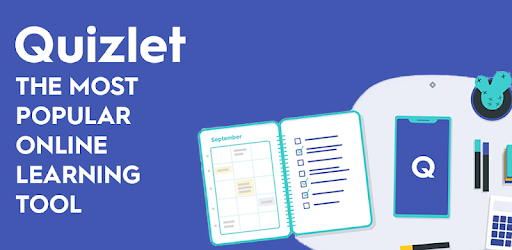
Also, if you're interested in computer science and coding, there are free online courses you can take such as "code.org" or "codeacademy.com". Coding isn't my thing, but I still had to learn it in my college so I know HTML, Javascript, Matlab, and Python. I learn Matlab and Python for the research aspect of my major of Civil Engineering (which I don't want to get into, I want to go just get my Bachelors or Masters into the construction industry).
That should be the end of the main stuff, so I'll begin my rants for the two main subjects of humanities and STEM.
Humanities
So Humanities is the umbrella term for your history classes, social sciences, and the English language arts. What is so great about humanity classes is that compared to STEM classes when there's almost always a correct answer, for humanities, the answer is debatable. With these classes, you need to not only memorize the material but understand it to utilize it. Memorizing is the easy part - and it should be if you use Quizlet as I told you to - but actually using it is where it gets difficult. From there, you can take any stance and as long as you defend it well, you can get full marks.
Let's say you're given an essay prompt asking if animal testing should be banned. It comes down to the two main arguments that say yes because of the cruelty of animals and no because of the benefits from testing to make something like a vaccine. Both are valid arguments, but regardless of what you pick, you will only get full marks if you defend it well. You can look at the previous chapter in "How to Write an Essay" to learn about the different techniques in defending an argument.
It will take practice in being able to effectively organize your thought process into creating an argument. That's why it's important to make an outline in order to do that.
For foreign language, all I can say is practice and put it into conversation as much as possible with your peers. I did two years of Spanish and all I know is to say "lo siento" and "no habla Espanol". I wish I took the class more seriously, but I was focused on my other classes instead and I was on the soccer team (it's soccer, not football, leave me alone lol).
If you have any questions about humanities, comment here and I'll try to answer them if your fellow readers haven't done so already.
STEM
So STEM is for what it stands for- science, technology, engineering, and math. This is where it gets difficult. High school math and science were easy until senior year when I did AP Physics C: Mechanics and AP Macro and Micro Economics. I remember one time, for AP Calculus AB, a friend told me we had a quiz that I didn't know we were going to have and therefore didn't study, and all I did was laugh and still aced it. Those were simpler times.
You're going to hate me for saying it, but I still have to. The best thing for you to do when studying for these classes is to practice. Easier said than done, right? Well, what do you expect? You get the grades you work for. I have come across my share of geniuses that make me frustrated, but you should always know that someone will always be smarter and better than you, just as you are smart and better than someone else - despite how hard it is to believe. If you're too busy comparing yourself to other people, that's time you're not improving yourself. Take it from someone with experience on it. I went from a PSAT score of 1190 to an SAT score of 1410 through months of hard work. I stopped writing my books because all I did was study for the SAT or work on my college applications. The fact you're reading this guide, to begin with, shows that you're willing to put in that work, now you actually have to do it.
If you have any questions about STEM, comment here and I'll try to answer them if your fellow readers haven't done so already.
General
I want to emphasize again that there are different ways to study in a class. In my freshman year of college for my General Chemistry course, I went through five different studying habits up until the final. Not only there are different classes you will have to take, but there are different teachers with different teaching styles and curriculums. Just as there is no one method for you, but there is no one method for a teacher and class. Sometimes it will be trial and error until you find the best studying style for yourself for teacher and class, but that's just how it is.
If you have any questions, comment here and I'll try to answer them if your fellow readers haven't done so already.
Bạn đang đọc truyện trên: Truyen247.Pro